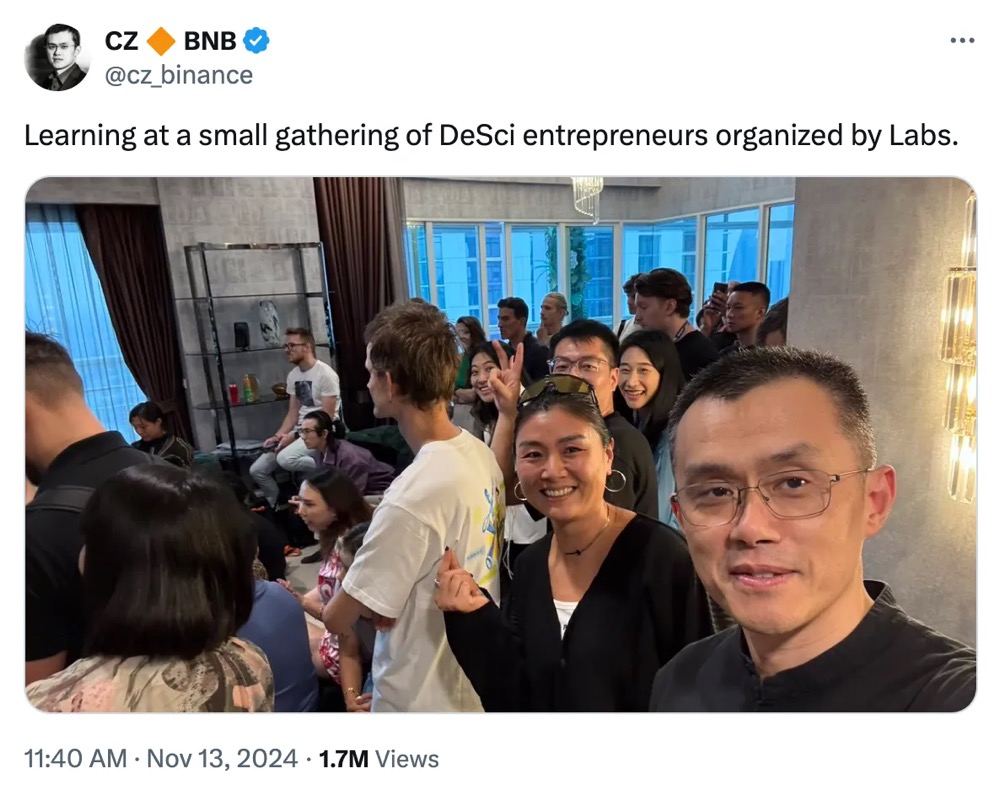Whether you are an old hand who has experienced several cycles or a newcomer to the industry, when faced with the Web3 industry that is almost constantly buzzing with hot spots or "wealth opportunities" after Trump's victory, you must be somewhat at a loss.
Sometimes it's all kinds of new animal-themed Memecoin ignited by big shots like Musk and V God, and sometimes it's the thousand-fold myths created by various AI agents.
Of course, there are also a steady stream of positive news, such as the constant influx of funds into the US Bitcoin spot ETF; the major listed companies led by MicroStrategy continuing or starting to build their own "Bitcoin strategic reserves"; and positive regulatory signals such as the Trump team considering setting up the first crypto policy-related position in the White House.
All of these are exuding a bullish atmosphere, and Bitcoin is also marching towards the $100,000 USDT mark. But what lies beneath the surface of the bull market? Matti of Zee Prime Capital pointed out the "undercurrents" in the current industry, that is, "the most entertaining outcome is the most likely to happen", and "opportunism is the strongest heterodoxy in cryptocurrencies."
The following is the full text translation.
If you left the cryptocurrency industry in 2022, or if you didn't really leave, but were attracted by various surface narratives, speculating on Memecoin and chasing the potential generational wealth, occasionally reading some industry articles. Then you should want to know what's really going on beneath the surface. Or, what have you missed?
In this era, there seem to be two phenomena that are shrouding the world.
- Musk's Razor: The most entertaining outcome is the most likely to happen (Note: The Occam's Razor principle states that in solving a problem, the simplest, most direct explanation or solution should be prioritized)
- What was once entertaining has become serious, and what was once serious has become entertaining
The first point is quite obvious. From the 2016 standard, to have Musk manage a US department called "DOGE" (Department of Government Efficiency) would be unthinkable. But 8 years have passed, and nothing is impossible now.
As for the second point, it is actually a manifestation of the first point. The US election has become a real-life TV show called "America". Politics has become entertainment, war casualties are live-streamed, movie plots are used to convey agendas, and social media posts can be prosecuted.
One of the minor symptoms of "what was once serious has become entertaining" is money. More precisely, Memecoin. They call it a magical internet currency, Funnymoney, an instant online meme lottery.

Not everyone can become a meme and profit from it, but everyone can get infinitely close to this goal by pumping Memecoin.
Clearly, sovereign states massively building Bitcoin reserves (following a batch of innovators like El Salvador and Bhutan), won't hastily dump like Germany did in August, leaving the public bewildered. Looking back, it's also obvious that people shouldn't expect a country that decides to continue shutting down nuclear power plants while waging a proxy war with its former largest energy supplier to make economically rational decisions.
Meanwhile, Michael Saylor is working hard to eliminate the root of all bubbles, trying to defeat sovereign states in this competition on Wall Street.
However, these are Financial Times-style news that readers don't really care about. What is surging beneath the surface? What has been brewing for a long time and is driving the surface bull market?
If you don't know who the user is - you are the user
For industry insiders, cryptocurrency has become a way of life. It's terrible to admit, but it's an undeniable fact. This way of life is the sum of consuming high-quality products of various cryptocurrency brands, a life of repeatedly transferring funds and losing money, but still hoping to "retire in glory" without much effort. To use Mable's words (perhaps not that direct):
"This is a way of life where 'the present' and 'the now' are the most important, because the impact of any person or thing is almost immediately reflected in what we are experiencing. The concept of ultimate outcome is almost outdated, because the world has truly become an infinite game."
As the cycle changes from "seasons" to "weeks", the development of the cryptocurrency industry is becoming faster and faster. The so-called "altcoin season", has now become the "altcoin week". Narratives are replaced more quickly than ever, and there are more distracting factors to choose from.
The cryptocurrency industry has truly entered the protopia world of Kevin - Kelly, "today's problems are caused by yesterday's technological successes, and the technological solutions to today's problems will create tomorrow's problems".
Cryptocurrencies are in a state of endless development. Gradual improvements that used to take a long time to manifest can no longer be seen, but now, just a little push, a small amount of liquidity, and the expectation of political inclination can turn the total quantity into a financial frenzy.
Everything in cryptocurrencies is monetized. It is money, the super-financialization of attention. And everyone is a user, even if they don't realize it.
Living in a state of development, you may not even realize that you are living in it, because you are forced to upgrade every day. Even if you don't consider yourself a novice, you are a novice every day. "The momentum of technological development drives us to chase the latest technology, and the latest technology always disappears when the next update appears, so the sense of satisfaction will constantly slip away from our hands."
In 2017, on-chain transactions through the order book (a tribute to Ethredelta) were a bad experience, and AMM was considered inefficient. In 2018, the problem was that no one wanted the tokens. By 2020, the market realized that they could make money by exchanging tokens on Uniswap without permission, and earn rewards by providing liquidity. Cryptocurrencies have entered an endless state of development.
The trend is good, but it's better to just give the "ticker"
What I know is that each time is different, but it is not. The difference is that the subtle differences in each frenzy are beyond the imagination and expectations of most people. We cannot predict where it will take us, especially considering that there are so many ecosystems and applications developing in various directions.
My most optimistic guess is that the pace of change will accelerate, some waves will return again, and path independence will become the most valuable resource for navigating such an environment. The so-called L1 or L2 ecosystems will become less important, as the trend becomes application/use case driven.
Among all the current use cases, I am most interested in the "proxy" and "DeSci" themes, as they complement the existing industries of DeFi and Memecoins. Synergies could lead to a Cambrian explosion of new use cases, and while some use cases are more flashy, I still hope that other use cases can bring real change.
If value can flow freely between DeFi, DeSci, and proxies, we can truly productize "investment progress" and wrap it in various memes. This way, it will self-reinforce and expand the cryptocurrency market to unforeseeable places.
We need cryptocurrencies to promote positive-sum games by creating new markets. And this may be the reason why large companies in the industry are exploring these topics, as they can quickly generate real-world impact. Anyone currently should not have imagined that Memecoins would become real-world assets.

It should be noted that, as with every frenzy, the demand for brilliant ideas will generate a constant stream of counterfeits, gimmicks, and scams.
The so-called heresy is not really heresy
The triggers for innovation may only become apparent in retrospect, just as in a utopia, the gradual accumulation of progress becomes clearly visible in a short period of time. What follows is that verification will blind people, and hunger will lead to power, which will ultimately develop into arrogance.
Bitcoin was the entry-level drug of the cryptocurrency industry, but it is no longer the case. At least for retail investors, it is no longer the case. Memecoin, as a monetized attention market, is becoming the access point for new users.
But they are just a momentum trade and have no foresight. It is a shock value replaced by a new shock value. No insight can predict this. They are as fleeting as any post on social media. They are a new media form, redefining social media.
Just recently, people have also realized that Memecoins can be attached to a vision and given a real role. The connection between GOAT and The Terminal Of Truth is the first example of linking Memecoin to the role of an AI agent. Subsequently, there were Luna (AI agent, not Terra Luna) and Eliza, although their expressions were quite generic, but this was enough to indicate that there is a design space for experimentation.
A few days ago, I discovered a Memecoin bound to an AI agent that can control robots globally, including driving robots and streaming robots (disclaimer: Frodobots is a portfolio company of ours, and we hold SAM).
If people continue to iterate at this pace, the game will still be interesting. All of this only proves that we are now in the heyday of cryptocurrency entertainment. (Meme) coins are the medium of consumption for people.

However, as it stands now, the term "proxy" is just a generic surface coating, and at the end of the day, it is a form of automated "babysitting". Nevertheless, it still provides novelty and expands the imagination. In addition to the so-called "cult" promises, it also forces a certain degree of innovation.
Terms like "believers" or "heresy" are used carelessly, but what I want to say is that the cryptocurrency industry has only one heresy, and that is the belief in "up only". Interestingly, this is a religion that maximizes rational economic choices while making irrational financial decisions. True heresy never calls itself heresy.
So, whether or not you've been in the industry these past few years, you may have overlooked the fact that cryptocurrencies are actually becoming a consumer product. It creates a new medium that allows people to consume in an era of dopamine-driven attention fragmentation, and its value is to some extent ephemeral.
All of this rides on the tailwinds of the economy and politics, and the most interesting result is a two-way street. Wealth can be lost in an instant, and the greatest opportunities often lie in asymmetric outcomes. What seemed most promising yesterday may not look like an opportunity, and the greatest threats are often overlooked.
Opportunism is the strongest heresy in cryptocurrencies.







